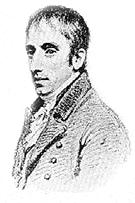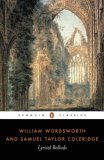William Wordsworth (1770-1850)
Wordsworth - stamp seller?
In April 1813 Wordsworth was appointed Distributor of Stamps for Westmorland. Although the £400 a year which went with this post made him financially secure, this acceptance of a government job by the former radical was seen as a betrayal - as Robert Browning wrote in The Lost Leader: "Just for a handful of silver he left us." Wordsworth compounded his teachery, in the eyes of the younger generation of poets, by campaigning for Tory politicians in the 1818 and 1820 elections.
Wordsworth published his long poem Peter Bell in 1819 and dedicated it to Robert Southey, who in 1813 had become the establishment's poet by accepting the office of Poet Laureate (Southey is mercilessly mocked by Byron in Don Juan). Shelley responded with a parody entitled Peter Bell the Third, mocking Wordsworth for his change of allegiances. In 1843, on the death of Southey, Wordsworth was himself appointed Poet Laureate.J K Stephen (1859-92) published a rather cruel sonnet on Wordsworth's subject matter and style in The Granta in 1891:
It learns the storm-cloud's thunderous melody,
Now roars, now murmurs with the changing sea,
Now bird-like pipes, now closes soft in sleep:
And one is of an old half-witted sheep
Which bleats articulate monotony,
And indicates that two and one are three,
That grass is green, lakes damp, and mountains steep:
And, Wordsworth, both are thine: at certain times
Forth from the heart of thy melodious rhymes
The form and pressure of high thoughts will burst:
At other times - good Lord! I'd rather be
Quite unacquainted with the ABC
Than write such hopeless rubbish as thy worst.
For all good poetry is the spontaneous overflow of powerful feelings: but though this be true, Poems to which any value can be attached, were never produced on any variety of subjects but by a man, who being possessed of more than usual organic sensibility, had also thought long and deeply. (Wordsworth: Preface to Lyrical Ballads, 1802 edition)
There's more about this parody by Stephen on Everything2. It seems he was 'an English Poetic Parodist [is that a job?], Royal Tutor, and International Law Scholar'.For more on Wordsworth, see:
- Moon poems, where his sonnet 'With how sad steps, O Moon' is featured alongsde Sidney's original
- Tintern Abbey: complete text of the 1798 version on this site
- Romanticism in English literature: the Literary Connections page on the movement in which Wordsworth played such an important part
Wordsworth in print
- The Prelude (1805), edited Ernest de Selincourt and Stephen Gill: it contains the original 1805 text edited from manuscripts with a comprehensive introduction and notes.
- There are free notes on Books I & II of The Prelude on English Online (note that these books are no longer set for LTA4).
- A Preface to Wordsworth by John Purkis: useful survey of Wordsworth's ideas, cultural context, etc. Comments on The Prelude are brief but apposite.
- Lyrical Ballads
by Wordsworth and Coleridge: the first, 1798, edition (the one specified for AQA's LTA4 examination). These volumes might also be useful:
- Lyrical Ballads (Routledge Classics)
: all the editions of the text, the Preface to the 1800 version and Wordsworth's appendix on 'Poetic Diction' from the 1802 edition. Note that you can also view all the editions of Lyrical Ballads on the Romantic Circles site (see below).
- Wordsworth and Coleridge: Lyrical Ballads by John Blades, a commentary in the Analysing Texts series from Palgrave Macmillan
- Heather Glen: Vision and Disenchantment: Blake's Songs and Wordsworth's Lyrical Ballads
(Cambridge Paperback Library) - recommended by Dr Alistair Cormack of the University of East Anglia as "the best book I've ever read on Blake and also the best book I've ever read on Wordsworth". Unfortunately it seems currently to be out of print so either try a library or a second-hand seller such as Abebooks or through the Amazon link here.
Wordsworth on the web
Editions of Wordsworth's poetry and prose:
- Selected Poetry and prose of William Wordsworth: from the University of Toronto, complete with footnotes and criticism
- Complete Poetical Works from Bartleby.com.
- Romantic Circles: this website includes a section devoted to Lyrical Ballads in its many editions, with collations, page images, a bibliography, and much more.
Wordsworth resources:
- Wordsworth Trust: the Trust "exists to be a living memorial to the life and poetry of William Wordsworth".
- Wordsworth on the Victorian Web: a rich source of materials and links, especially for advanced students and teachers.


